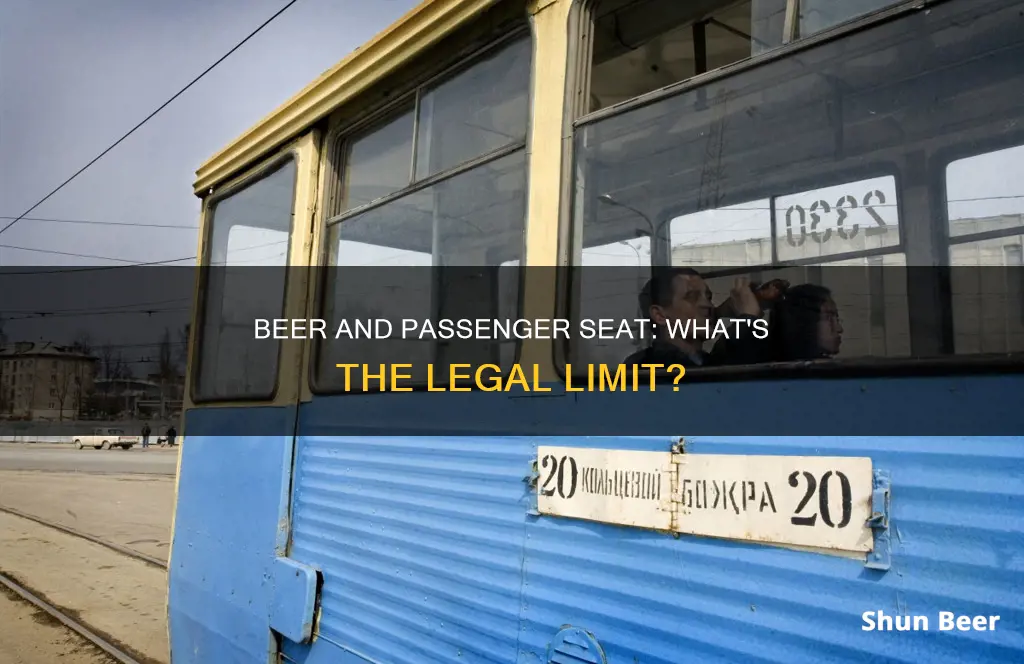
Drinking in the passenger seat of a car is a topic that raises many questions about legality and safety. While drunk driving is illegal, the laws surrounding drinking as a passenger are less clear-cut and vary depending on location. Most states in the US have laws prohibiting open containers of alcohol inside vehicles, but there are exceptions to these rules. For example, in some states, passengers are allowed to drink in hired vehicles such as taxis or limousines, and in others, passengers may drink while the vehicle is on private property. Understanding these laws is critical to knowing your rights and avoiding penalties, which can include fines or even arrest.
| Characteristics | Values |
|---|---|
| Legal drinking in a car for passengers | Varies depending on the state and country |
| US federal law | Prohibits drinking in a moving vehicle |
| UK law | Drinking alcohol is allowed in a private vehicle, but not on public transport |
What You'll Learn

Where drinking in the passenger seat is allowed
Drinking alcohol in the passenger seat of a car is a complex issue that varies depending on location and context. Here is an overview of where drinking in the passenger seat is allowed:
States Where Drinking in the Passenger Seat is Legal
Although laws vary by state, some US states do allow passengers to drink alcohol in a car. These include Alaska, Connecticut, Delaware, Mississippi, Missouri, Tennessee, and Virginia. In these states, passengers may be able to drink in a moving vehicle without restriction. However, it's important to note that local ordinances may still prohibit open containers in certain areas.
Exceptions to Open Container Laws
Even in states with strict open container laws, there are some exceptions where drinking in the passenger seat may be permitted:
- Motorhomes and Hired Vehicles: In most states, passengers are allowed to possess open containers and consume alcohol in hired vehicles like taxis, limousines, and party buses.
- Storage in Inaccessible Areas: In many states, it is permissible to store open containers in areas of a vehicle that are not readily accessible to passengers or the driver, such as the trunk.
- Transporting Open Containers: Transporting an open container of alcohol, such as an unfinished bottle of wine from a restaurant, is generally allowed as long as it is stored in an inaccessible area.
- Age Restrictions: It is important to note that these laws only apply to individuals of legal drinking age, typically 21 years or older.
International Variations
The legality of drinking in the passenger seat also varies internationally. For example, in New South Wales, Australia, it is legal for passengers to drink alcohol in a private vehicle, but it is illegal to do so on public transport or in a taxi.
Craft Beer Festivals: All-You-Can-Drink Events?
You may want to see also

Where drinking in the passenger seat is illegal
Drinking in the passenger seat of a car is illegal in most states in the US. However, there are some states where passengers are allowed to drink alcohol in a car without restriction. These include Connecticut, Delaware, Missouri, Tennessee, and Virginia. In Alaska, passengers can drink if the open container is behind a solid partition separating the driver from the area occupied by passengers.
In Mississippi, the laws are even more relaxed, as drivers are allowed to drink from an open bottle as long as they remain under the legal blood alcohol concentration (BAC) limit.
Rhode Island also has a more complicated law, where drinking as a passenger is allowed, but having an open container means the driver is breaking the law and can be fined or have their license suspended.
Some states, such as Alabama, Arizona, California, Colorado, the District of Columbia, Florida, Georgia, Hawaii, Idaho, Kansas, Michigan, Nevada, Oregon, and Wyoming, will land you in trouble if you drink as a passenger.
The penalties for drinking as a passenger vary from state to state. For example, in North Carolina, you can be fined up to $100, while in Vermont, the maximum fine is $25, and in Idaho, it's $100.
Beer and Breastfeeding: Is It Safe to Drink Alcohol?
You may want to see also

The penalty for drinking as a passenger
For example, in North Carolina, drinking as a passenger will attract a fine of up to $100, while in Vermont, the maximum fine is $25, and in Idaho, it is $100. In Washington D.C., a passenger drinking conviction is a misdemeanour that can result in a fine or up to 60 days in jail. In Arizona, drinking as a passenger is a class 2 misdemeanour, which can result in a $750 fine, four months in jail, or probation.
It is important to note that the blood alcohol concentration (BAC) of an offending passenger is irrelevant in most cases, and even if only the passenger has been drinking, the driver may also be penalised.
Drinking Beer and Taking Diatizem: What You Need to Know
You may want to see also

Who gets penalised for breaking open container laws?
The penalties for breaking open container laws vary from state to state. In most states, both the driver and the offending passenger may be penalised for breaking open container laws, even if only the passenger has an open container.
In Idaho, for example, drivers can face $1,000 fines, six months in jail, and a misdemeanour charge for driving with an open container in their vehicle. Passengers, on the other hand, will be charged with a minor infraction and minimal fines.
In North Carolina, the penalty for drinking as a passenger can attract a fine of up to $100, while in Vermont, the maximum fine is $25, and in Idaho, it is $100.
In some states, open container laws only apply to the driver and not to passengers. In other states, passengers are allowed to possess open containers but not consume alcohol.
Beer and Diabetes: Is It Safe to Drink?
You may want to see also

Exceptions to open container laws
- Vehicle Type: Open container laws typically do not apply to the living quarters of motor homes, RVs, or hired vehicles like taxis, limousines, and party buses.
- Storage Location: Open containers may be allowed in areas of a vehicle that are not readily accessible to passengers or the driver, such as the trunk or, for vehicles without a trunk, behind the last upright seat.
- Private Property: In most states, passengers are allowed to drink alcohol in a vehicle parked or operating on private property.
- Local Ordinances: Some municipalities, like the French Quarter in New Orleans, have carved out exceptions to open container laws to boost tourism. These exceptions typically apply only to streets and sidewalks and not to vehicles.
Beer Drinking: Dehydration and You
You may want to see also
Frequently asked questions
It depends on where you are. In the US, most states have laws prohibiting the presence of open bottles, cans, or other unsealed alcoholic drinks containers inside vehicles, on sidewalks, or in the streets. These are known as open container laws. However, there are exceptions. In some states, passengers are allowed to drink in the car without restriction. These include Connecticut, Delaware, Missouri, Tennessee, and Virginia. In Alaska, passengers can have an open container behind a solid partition that separates the driver from the area occupied by passengers.
An open container is any container of alcohol with a broken seal. The container doesn't have to be open for it to be considered "open". If the seal has been broken, it's an open container.
The punishment for drinking as a passenger varies from state to state. For instance, in North Carolina, you can be fined up to $100, in Vermont, the maximum fine is $25, and in Idaho, the fine is $100.







